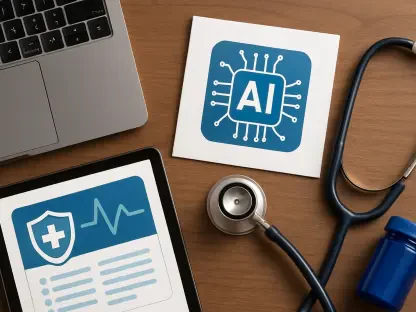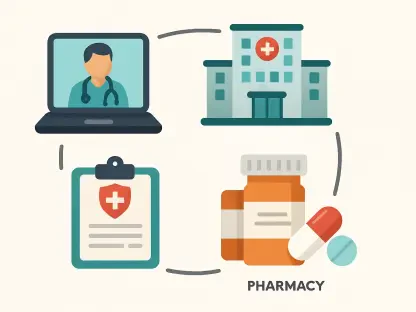Blockchain technology is making waves across various industries, and the pharmaceutical sector is no exception. With its decentralized and secure digital ledger systems, blockchain is poised to address some of the industry’s most persistent challenges, including counterfeit drugs, supply chain inefficiencies, and data transparency issues. This article delves into the transformative potential of blockchain technology in revolutionizing pharmaceutical operations, enhancing trust, and improving patient outcomes.
Combating Counterfeit Drugs with End-to-End Transparency
The Counterfeit Drug Problem
Counterfeit drugs are a significant issue in the pharmaceutical industry, costing billions of dollars and endangering lives. These fake medications can be ineffective or even harmful, undermining public trust in healthcare systems. The complexity of the pharmaceutical supply chain makes it difficult to track and verify the authenticity of drugs, creating opportunities for counterfeiters. The scope and scale of counterfeit drug trafficking are staggering, with an estimated 10% of all pharmaceutical products circulating in developing countries being counterfeit. This pervasive problem not only results in severe health risks for patients but also causes substantial financial losses for pharmaceutical companies and undermines the overall integrity of healthcare systems globally.
Blockchain’s Role in Drug Authentication
Blockchain technology offers a robust solution to this problem by providing end-to-end transparency. Each drug can be assigned a unique identifier, and every transaction from manufacturing to delivery can be recorded on an immutable ledger. This allows for real-time tracking and verification of drug authenticity, ensuring that only genuine products reach consumers. By using blockchain for drug authentication, companies can create a secure digital trail from the drug’s origin to its final destination. Each transaction, as it occurs in the supply chain, is verified and recorded, making it virtually impossible for counterfeit products to infiltrate the supply chain without detection. The reliability and security of blockchain technology ensure that patients and healthcare professionals can trust the medicines they use and prescribe.
Real-World Applications
Platforms like MediLedger are already helping pharmaceutical companies track and verify drug shipments. By scanning a blockchain-registered code, pharmacists and consumers can confirm a drug’s authenticity, significantly reducing the risk of counterfeit drugs. This enhanced transparency builds trust among all parties in the supply chain. As a result, the pharmaceutical industry is witnessing a shift towards greater accountability and security. Projects utilizing blockchain technology can provide enormous amounts of traceable data, making it easier to pinpoint where problems might have occurred during manufacturing or distribution. This not only benefits patients and healthcare providers but also boosts the efficiency and reliability of the pharmaceutical industry as a whole.
Improving Clinical Trial Data Transparency
Challenges in Clinical Trials
Clinical trials are essential for developing new drugs, but data manipulation and a lack of transparency can undermine their credibility. Inaccurate or tampered data can lead to ineffective or unsafe medications reaching the market, posing risks to patients and damaging the reputation of pharmaceutical companies. The integrity of clinical trial data is crucial for ensuring that the drugs developed are safe and effective for public use. Poor data management and inadequate oversight can contribute to the approval of drugs that might not provide their intended benefits or, worse, could be harmful. This has led to increased scrutiny and demand for transparency in clinical trial processes.
Blockchain for Secure Data Recording
Blockchain can securely and immutably record clinical trial data, ensuring that all stakeholders have access to reliable, tamper-proof information. This technology prevents unauthorized changes to trial results, ensuring accurate and credible reporting. Additionally, smart contracts can automate the patient consent process, ensuring adherence to ethical guidelines. By utilizing blockchain, pharmaceutical companies can maintain a transparent and secure record of all trial-related data, from patient enrollment to final results. This measure not only enhances the credibility of the trials but also promotes greater cooperation and trust among researchers, patients, and regulatory bodies involved in the drug development process.
Industry Adoption
Pharmaceutical giants like Pfizer are exploring blockchain-based systems to improve the accuracy and accessibility of clinical trial records. By providing a shared, trustworthy data source, blockchain fosters better collaboration among researchers, sponsors, and regulatory authorities, ultimately leading to more effective and safer drugs. The adoption of blockchain technology in clinical trials signifies a commitment to transparency, accountability, and patient safety in the pharmaceutical industry. This approach ensures that all data collected during the trial is accurate, untampered, and readily accessible to all participants, thus paving the way for more robust drug development and approval processes.
Enhancing Supply Chain Efficiency
Complexity of Pharmaceutical Supply Chains
Pharmaceutical supply chains are intricate, involving multiple stakeholders and requiring stringent temperature controls during transportation. Any disruption or error in the supply chain can compromise drug safety and efficacy, leading to significant financial losses and potential harm to patients. Supply chain inefficiencies can also result in delays in drug delivery, affecting patients’ treatment schedules and health outcomes. The complexity of the supply chain, coupled with the critical nature of the products being transported, necessitates a system that can provide real-time oversight and corrective measures when things go wrong.
Blockchain and IoT Integration
Integrating blockchain with IoT devices can ensure transparency and real-time monitoring of drug conditions during transit. Every stage of the supply chain, from production to delivery, can be documented on the blockchain, providing traceability and quality assurance. Temperature-sensitive drugs, like vaccines, can be monitored in real-time to ensure proper storage conditions. IoT devices can provide critical data related to the condition and location of drugs during transit, while blockchain technology ensures that this data is securely recorded and easily accessible. This level of integration offers unprecedented visibility into the pharmaceutical supply chain, helping prevent mishandling, spoilage, and delays.
Benefits and Examples
IBM Blockchain collaborates with pharmaceutical companies to create systems that ensure both drug safety and supply chain efficiency. Streamlined documentation processes minimize shipment delays and errors, reducing costs and improving patient outcomes. This real-time monitoring capability is crucial for maintaining the integrity of pharmaceutical products. By implementing blockchain-based solutions, pharmaceutical companies can vastly improve their supply chain operations, ensuring that the right drugs are delivered to the right places at the right times, under the right conditions. This increases overall efficiency and reliability, benefiting patients and industry stakeholders alike.
Streamlining Patient Data Management
Challenges in Managing Patient Data
Managing and securing patient data is challenging yet essential for developing personalized medicines and improving healthcare outcomes. Traditional systems often struggle with data fragmentation and security issues, making it difficult to provide comprehensive and secure patient care. Ensuring patient privacy while facilitating data sharing among healthcare providers is a delicate balance. Fragmented data systems can result in incomplete patient records, leading to potential misdiagnoses and suboptimal treatment plans. Moreover, the rising number of cyberattacks targeting healthcare institutions highlights the need for advanced security measures to protect sensitive patient information.
Decentralized Health Records
Blockchain can create decentralized health records that are accessible only with patient authorization, giving patients control over their medical data. This approach enhances privacy and compliance with regulations like GDPR and HIPAA. By consolidating medical data from various providers, blockchain provides healthcare professionals with a complete picture of a patient’s health. With blockchain, patients can grant temporary access to their health records to their doctors or specialists, ensuring that healthcare providers have all the necessary information to make informed decisions. This consolidates important medical data in a secure manner, reducing redundancies and errors while giving patients the peace of mind that their personal information is safeguarded.
Real-World Implementations
Platforms such as Medicalchain enable secure, decentralized access to medical records, facilitating smoother data sharing between patients and healthcare providers. This patient-centric approach ensures that individuals have control over their data, enhancing trust and improving healthcare outcomes. By leveraging blockchain technology, Medicalchain allows patients to interact with their medical data in a secure environment, giving them the ability to manage consent and track who has accessed their information. This transparency and control can lead to better trust between patients and healthcare providers, resulting in improved patient engagement and adherence to treatment plans.
Enabling Efficient Drug Recalls
Complexity of Drug Recalls
Drug recalls are often complex, time-consuming processes that can jeopardize public health and damage a company’s reputation. Identifying and removing specific batches of defective or contaminated drugs from the market can be challenging, leading to delays and increased risks for patients. Recalls can incur significant costs and require extensive coordination across various parts of the supply chain to track down every affected batch. This process often exposes the limitations of traditional tracking systems, which may lack the capability to provide accurate, timely information.
Blockchain for Traceability
Blockchain’s traceability feature allows pharmaceutical companies to quickly identify and recall specific batches of faulty drugs. This capability enables faster response times, reducing risks to patients and minimizing financial losses. Accurate tracking limits recalls to only the affected batches, reducing waste and ensuring regulatory compliance. By providing an immutable record of every transaction and interaction in the drug’s lifecycle, blockchain offers a comprehensive audit trail that can be accessed quickly in the event of a recall. This level of traceability is crucial for maintaining public trust and ensuring that any issues are addressed swiftly and effectively.









